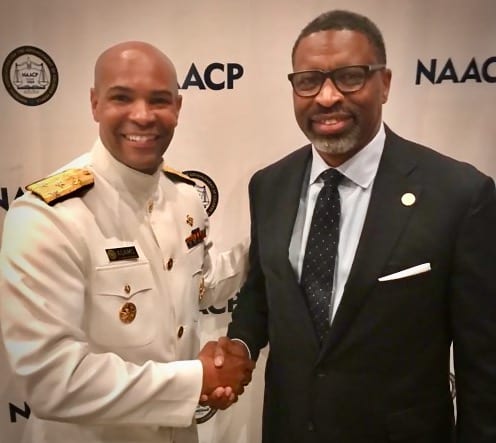“This virus will have dire consequences on so many, but specifically African Americans, which suffer from higher rates of chronic illness.”
That was part of the message of Derrick Johnson, president and CEO of the NAACP, conveyed Sunday evening during the NAACP’s emergency town-hall tele-call about the COVID-19 pandemic.
“The truth is that there are so many within this nation that are disenfranchised from receiving adequate and affordable care due to socio-economic circumstances,” said Johnson
The NAACP hosted the tele-call to focus specifically on the virus’ potential impact on communities of color.
“It’s going to be a tough several weeks ahead and things will get worse before they get better,” said U.S. Surgeon General Dr. Jerome Adams, who was among the health experts, elected officials and faith-based leaders that joined Johnson on the call.
Also “attending,” were: Sen. Kamala Harris, Congresswoman Robin Kelly, La June Montgomery Tabron (President & CEO, W.K. Kellogg Foundation), Dr. Rich Besser, (President & CEO Robert Wood Johnson Foundation), Dr. Jerry Young (president, National Baptist Convention), the Rev. Traci Blackmon (United Church of Christ), and Nicolette Louissaint (PhD, executive director, Healthcare Ready).
“We know that older people and people with underlying health conditions, like heart disease, lung disease and diabetes, are twice as likely to develop serious outcomes versus otherwise younger, healthier people,” Adams said. “These are conditions that we know affect African Americans at disproportionate rates. And we have to address them.”
The Centers for Disease Control and Prevention has said that older populations, and people with preexisting diseases, are at greater risk of dying from COVID-19.
And then there is the issue of potential financial burdens due to not being able to report to work.
According to the Bureau of Labor Statistics (BLS), only about 29 percent of the workforce was able to work from home. Ninety percent of higher-wage workers received paid sick leave compared to lower-income worker; and just 31 percent of workers with salaries in the bottom 10 percent were allowed paid sick leave.
Among the working poor, African-American workers will witness an even greater impact.
During the tele-call. Sen. Harris and Rep. Robin Kelly highlighted two new bills that they hope will soften the blow of the economic downturn.
Friday, President Donald Trump signed an emergency supplemental spending bill to aid the US’s response to the novel coronavirus outbreak.
The spending package will make available $8.3 billion in federal assistance to government health officials and to support research and development of a vaccine.
The U.S. House of Representatives also passed a relief bill late Friday night aimed at containing the widening effects of the coronavirus on the nation’s economy. The bill guarantees sick leave for workers and their families affected by the coronavirus, injects fund into state unemployment reserves, and guarantees free COVID-19 testing.
The Senate considers the measure this week.
“People shouldn’t have to choose between staying at home and putting food on their table to feed their babies,” Harris said during the call. “So, join me in making sure that the Senate does what it’s supposed to do and vote on this bill without delay. Call your Senators.”
Harris also noted a distrust among people of color and the government, along with health care providers. She urged citizens to encourage their neighbors to go to the doctor when they feel sick and take necessary precautions.
Adams reiterated Harris’ plea, first saying that he’s aware of the distrust that some may have of him due to his affiliation with the current administration. He then reassured the audience that he “knows what it’s like growing up poor, black, and with minimal access to healthcare,” adding that he’s spent his life fighting for “the poor, disadvantaged, and people of color.”
“I hope I can earn your trust,” he said. “Because now is a critical time.”
According to Adams, the U.S. is now in mitigation mode; and the decisions made within the next few weeks will determine if the country will be able to “limit infections and decrease deaths like South Korea or go the way of Italy that has seen skyrocketed number of deaths.”
So far, there have been 3,000-plus confirmed cases of the coronavirus in the U.S. and more than 60 deaths. Adams said the situation is likely to escalate. More tests are expected to become available within the next couple of weeks, he said.
Adams also highlighted a three-point plan that he said can help mitigate the impact of the virus: *Start off by knowing the risks, if you have any pre-existing conditions or are 60 and older;
*Understand and control circumstances by social distancing and not gathering in places of 50 or more people; and
*Be sure to get the facts through trusted sources such as the coronavirus.gov website or the Centers for Disease Control and Prevention.



